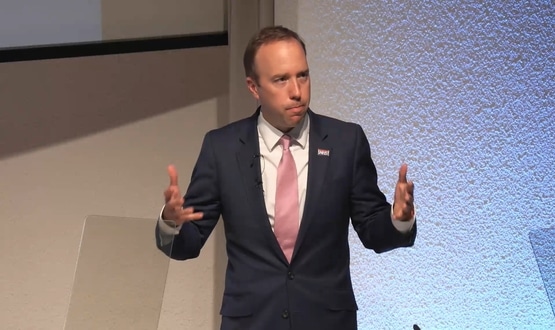Hancock: NHS needs to ‘double down’ on tech advances after Covid-19
- 30 July 2020

The NHS needs to “double down” on the technological advances made during Covid-19 to ensure they continue after the pandemic, health secretary Matt Hancock has said.
Speaking about the future of healthcare at a Royal College of Physicians event, Hancock told the audience better technology was needed for better healthcare.
“We want to double down on the huge advances we’ve made in technology within the NHS and social care, because it’s not really about technology, it’s about people,” he said.
The health secretary also said in his speech that digital services should be used to keep patients out of hospital when appointments aren’t essential, free up clinicians time, and better connect people with their care.
Referencing difficulties in developing new technology, Hancock added they don’t make it “any less valuable”.
“To promote collaboration and change we need more transparency, better use of data, more interoperability and the enthusiastic adoption of technological innovation that can improve care,” he said.
“This crisis has shown that patients and clinicians alike, not just the young, want to use technology.
“When it comes to their healthcare, whether they’re digital natives or digital converts, they [patients] don’t want to sit around in a waiting room if that service can come to them at home.”
According to Hancock, in the future, all GP appointments should be done through teleconsultations unless there’s a “compelling reason not to” to make care easier to manage and allow the NHS to provide a “much better” service. This was echoed earlier in the year by the Digital Healthcare Council, which said telephone and text consultations have been favoured by patients during the pandemic.
Seven key lessons learned during the pandemic, were also outlined by the health secretary, which he described as like “sheet lighting on a dark night” shining a light on the NHS and where improvement was needed.
Aside from better technology, Hancock outlined a need for better collaboration and integration across healthcare borders; better accountability; and a reduction in “bureaucratic barnacles” to allow for faster adoption across the NHS.
He said the Covid-19 crisis had provided “stark clarity” on where the NHS needs to evolve and forced it to improvise new ways of doing things that “will become permanent because they are a better way of doing things”.
“We’ve got to bottle the best”, Hancock said.
“Innovation is not just about coming up with the idea, it’s about having the backing and the permission to make the change.”





6 Comments
Matt Hancock seems all about the focus and drive to new technology but fails to understand what this actually means . We have been lobbying his area for some time to get some funding to aid AI enabled early cancer diagnosis which will reduce the long delays by 70%.
Come on let’s get the funding to companies who already have a solution instead of re inventing the wheel ?
……
Wanted to exactly understand the American phrase “double-down” and got an interesting result from Dictonary.com.
Outside of gambling, double down is often used by politicians, business leaders, and media outlets to describe approaching some problem with more focus, energy, and resources, especially when that tactic is seen as ill-advised.
I particulary found the last that nine words to be interesting, especially related to many decisions made since lock down restrictions were being lifted.
He knows a bit about technology, but nothing about health care.
When all you have is a hammer, everything looks like a nail.
“This was echoed earlier in the year by the Digital Healthcare Council, which said telephone and text consultations have been favoured by patients during the pandemic.”
Of course telephone and text consultations have been favoured by patients during the pandemic. Indeed no consultations have been favoured by patients during the pandemic. In case Mr Hancock has not thought of this, there was a very good reason for this preference during the pandemic – namely the pandemic.
Those committed to economic growth in the digital technology sector, at the expense of healthcare, will always hear what they want to hear, see what they want to see and will forever be totally blind to the systematic degradation of healthcare to which Mr Hancock and his colleagues are unflinchingly committed.
How does doubling down differ from doubling up?
And redoubling.
Comments are closed.